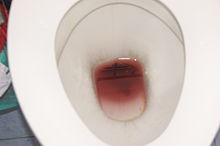Hematochezia
| Hematochezia | |
|---|---|
| Other names | Haematochezia |
 | |
| Specialty | Gastroenterology |
| Symptoms | Bright blood in stool |
| Causes | Hemorrhoid, gastritis, gastrointestinal bleeding, stomach cancer |
Hematochezia is a form of blood in stool, in which fresh blood passes through the anus while defecating. It differs from melena, which commonly refers to blood in stool originating from upper gastrointestinal bleeding (UGIB).[1] The term derives from Greek αἷμα ("blood") and χέζειν ("to defaecate"). Hematochezia is commonly associated with lower gastrointestinal bleeding, but may also occur from a brisk upper gastrointestinal bleed. The difference between hematochezia and rectorrhagia is that rectal bleeding is not associated with defecation; instead, it is associated with expulsion of fresh bright red blood without stools.[2] The phrase bright red blood per rectum is associated with hematochezia and rectorrhagia.
Causes
[edit]In adults, most common causes are hemorrhoids and diverticulosis, both of which are relatively benign; however, it can also be caused by colorectal cancer, which is potentially fatal. In a newborn infant, haematochezia may be the result of swallowed maternal blood at the time of delivery, but can also be an initial symptom of necrotizing enterocolitis, a serious condition affecting premature infants. In babies, hematochezia in conjunction with abdominal pain is associated with intussusception. In adolescents and young adults, inflammatory bowel disease, particularly ulcerative colitis, is a serious cause of hematochezia that must be considered and excluded.
Hematochezia can be due to upper gastrointestinal bleeding. However, as the blood from such a bleed is usually chemically modified by action of acid and enzymes, it presents more commonly as black "tarry" feces known as melena. Haematochezia from an upper gastrointestinal source is an ominous sign, as it suggests a very significant bleed which is more likely to be life-threatening. Eating beetroot can cause harmless red-colored feces (beeturia) because of insufficient metabolism of a red pigment, and is a differential sign that may be mistaken as hematochezia. Consumption of dragon fruit (pitaya) or blackberries may also cause red or black discoloration of the stool and sometimes the urine (pseudohematuria). This too, is a differential sign that is sometimes mistaken for hematochezia.[citation needed]

In infants, the Apt test can be used to distinguish fetal hemoglobin from maternal blood.
Other common causes of blood in the stool include:
- Colorectal cancer[3][4][5][6][7]
- Crohn's disease[8]
- Ulcerative colitis[9]
- Other types of inflammatory bowel disease, inflammatory bowel syndrome, or ulceration
- Rectal or anal hemorrhoids or anal fissures, particularly if they rupture or are otherwise irritated[citation needed]
- Shigella[10] or shiga toxin producing [11] E. coli food poisoning[12]
- Necrotizing enterocolitis[citation needed]
- Menstruation
- Dysentery
- Diverticulosis[13]
- Salmonellosis[14]
- Upper gastrointestinal bleeding[15]
- Peptic ulcer disease[16]
- Esophageal varices[17]
- Gastric cancer[18]
- Angiodysplasia
- Intense exercise, especially a high-impact activity like running in hot weather.[19]
- Radiation proctitis
Diagnosis
[edit]A complete blood count as well as an hemoglobin test should be performed when a patient presents symptoms of hematochezia. A colonoscopy may be necessary if there is suspicion of bleed from colon particularly in the elderly to look for the site and many causes of bleed like carcinoma, ulcerative colitis, rectal varices or other lesions and in certain instances upper gastrointestinal endoscopy may be required as well to look for any rapid and massive fresh bleed from upper gastrointestinal tract when there may not be sufficient time for the change of colour of blood to occur.[20]
See also
[edit]References
[edit]- ^ Taber's Cyclopedic Medical Dictionary. Donald Venes. 20th Edition. Page 955.
- ^ Sáenz, Roque; Valdivieso, Eduardo. "Approach to lower gastrointestinal bleeding" (PDF). p. 2. Archived from the original (PDF) on 2013-12-13.
- ^ "Colon Cancer Symptoms - What are Colon Cancer Symptoms". Coloncancer.about.com. 2009-01-20. Archived from the original on 2012-01-01. Retrieved 2012-01-31.
- ^ "Colon cancer: Symptoms". MayoClinic.com. 2011-08-13. Retrieved 2012-01-31.
- ^ Lenz, Heinz-Josef (2009-03-06). "What are Early Symptoms of Colorectal Cancer? Watch out for Small Changes". Alexandria, Virginia, United States: Fight Colorectal Cancer. Archived from the original on 2009-03-10. Retrieved 2013-02-23.
- ^ "Colon Cancer Symptoms - Colorectal Cancer Symptoms". Webmd.com. 2010-10-31. Retrieved 2012-01-31.
- ^ "Crohn's Disease: Inflammatory Bowel Diseases (IBD): Merck Manual Home Edition". Merckmanuals.com. Retrieved 2012-01-31.
- ^ "Crohn's disease: Symptoms". MayoClinic.com. 2011-08-09. Retrieved 2012-01-31.
- ^ "Ulcerative Colitis - Symptoms, Causes and Treatments of Ulcerative Colitis". Webmd.com. 2010-10-07. Retrieved 2012-01-31.
- ^ "Causes and Symptoms of Shigellosis". Minnesota Department of Health. Archived from the original on 2017-05-02. Retrieved 2015-05-22.
- ^ "Escherichia coli O157:H7 (E. coli O157)". Minnesota Department of Health. Archived from the original on 2017-06-02. Retrieved 2015-05-22.
- ^ "Symptoms of E. coli Infection | E. coli Food Poisoning". About-ecoli.com. Retrieved 2012-01-31.
- ^ "Diverticulitis: Diverticular Disease: Merck Manual Home Edition". Merckmanuals.com. Retrieved 2012-01-31.
- ^ "Salmonella infection: Symptoms". MayoClinic.com. 2011-04-16. Retrieved 2012-01-31.
- ^ Upper Gastrointestinal Bleeding at eMedicine
- ^ "Peptic ulcer: Symptoms". MayoClinic.com. 2011-01-06. Retrieved 2012-01-31.
- ^ "Esophageal varices: Symptoms". MayoClinic.com. 2010-10-30. Retrieved 2012-01-31.
- ^ Gastric Cancer at eMedicine
- ^ Davis, Matthew; Davis, Peter; Ross, David (2005). Expert Guide to Sports Medicine. American College of Physicians. p. 136. ISBN 9781930513648.
- ^ Eckmann JD, Chedid VG, Loftus CG (2018). "A rational approach to the patient with hematochezia". Curr Opin Gastroenterol. 34 (1): 38–45. doi:10.1097/MOG.0000000000000409. PMID 29059071. S2CID 23181441.
